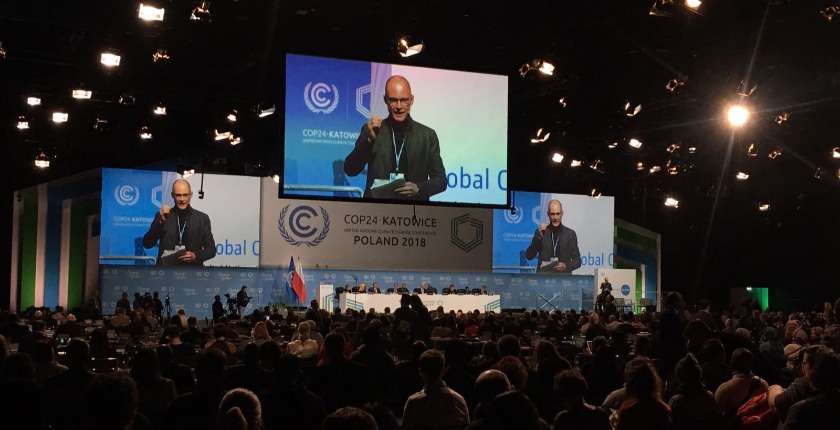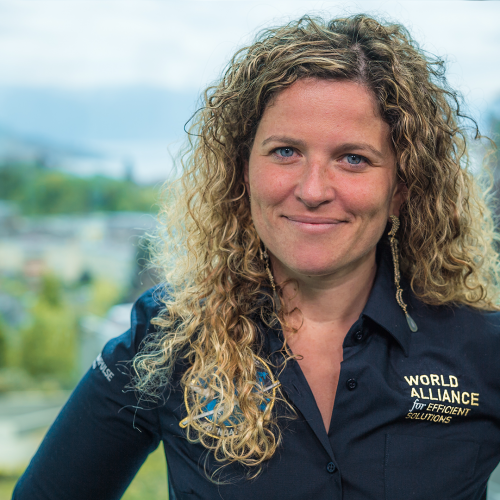News - December 14, 2018
COP24 - Clean Technologies are "the biggest market of the century”


Written by Chiara Cosenza
A sense of urgency
"We are in trouble. We are in deep trouble with climate change. Climate change is running faster than we are and we must catch up sooner rather than later before it is too late.”
Those were the opening remarks from Antonio Guterres, UN Secretary General, on December the 3rd at the UN Conference on Climate Change COP24 in Katowice. (Full speech here).
A couple of days before, the Solar Impulse team had arrived in Katowice, in Poland’s Silesia region known historically for its’ coal industry.
What was Solar Impulse Doing there?
Our objective at the COP24 was to generate awareness and drive action on the adoption of clean technologies and modern regulations that will create a need for them to be implemented. How? Through multiple interventions by Bertrand Piccard in his role as Chairman of the Solar Impulse Foundation, as well as through bilateral meetings and partnerships.
A few of the Solar Impulse labelled solutions were invited to attend in order to pitch their solutions to government, industry, institutional representatives and show them how such solutions are an amazing investment opportunity, and not a cost.
“Negotiators, be bold”
On the first days of the COP24, Bertrand Piccard wrote a letter encouraging negotiators to be bold, to set ambitious goals against climate change.
“You must accept that this enormous responsibility is in your hands. You could of course resist and dig into entrenched positions. Or you can act as heroes and rise to the challenge of creating the framework that will enable us to decarbonize our economy as fast as possible. The choice is a stark one: stagnation or progress, timidity or audacity. Which will you choose?”
“Thanks to technological developments, the fight against global warming is no longer a constraint. Quite the contrary: it has become a huge opportunity, and I see it day after day. Since the success of the first round-the-world flight by solar airplane and through the Solar Impulse Foundation, I have met hundreds of entrepreneurs and innovators offering solutions in the fields of water, energy, mobility, cities, agriculture and industry. And unlike ten years ago, the new systems, products and technologies that make up these solutions have now become financially viable. This is how, in both the poorest and richest countries, we can create jobs and wealth, reduce inequalities, increase social stability and boost growth whilst also protecting the environment. In other words, we can achieve clean, qualitative growth which is clearly preferable to our present contaminated predicament. The replacement of outdated and polluting infrastructures with modern and efficient ones is the industrial market opportunity of the 21st century.” (Read the full letter here)
Clean Energy vs Fossil Fuels
The dichotomy between a clean energy future and the short-term needs of local and global economies that depend on fossil fuels was clear, but in our view it does not need to exist. Why?
The first step, before destroying an industry and generate public resistance to change, is to make our economy much more efficient. As Bertrand said during one of his interventions at the COP, our relationship with energy use is akin to someone in a bathtub that is leaking, with water running out of it. To keep it topped up, instead of searching for and fixing the leak, we simply open the water tap more, wasting water unnecessarily. We need to find and repair the leak first.
Secondly, we need to push oil and gas companies to diversify their assets by investing in clean energy. During the transition to clean technologies we will still need oil, and if oil companies crash in the process, because investors sell their shares, we all crash.
Solutions Exist
In order to transform our economy, hundreds of clean and profitable solutions exist all over the World. The Solar Impulse Foundation has set the challenge to label 1000 of them and bring them to decision-makers. (link)
At COP24, a few of those Solutions from the Solar Impulse Foundation portfolio had the opportunity to pitch in COP24's Action Hub, and show that change is possible now. (Read full article here)
Partnerships in order to accelerate adoption of clean technologies
In a joint statement, France's Laurent Fabius, Frank Bainimarama from Fiji, Salaheddine Mezouar from Morocco, and Peru's Manuel Pulgar Vidal said: "The challenges are there, as are the solutions. "We require deep transformations of our economies and societies to build a better world for all. This must be powered by multilateral co-operation." (source : https://www.independent.co.uk/environment/david-attenborough-climate-talks-cop-24-poland-global-warming-civilisations-collapse-a8664856.html= )
Some countries, institutions and governments are willing to lead the way with ambitious targets and are looking for solutions to solve their environmental challenges, as well as an opportunity for the solutions coming from their regions to reach a global market. Their intention? Speed up the rate of adoption, as time is running out.
For this reason, the Solar Impulse Foundation has partnered with multiple institutions and country representatives. Some of them were present at COP24 : Scotland, UNCTAD, Wallonie, REN21, France - Open Planet Lab, as well as UNFCCC.
As Sir David Attenborough said during the COP24 Opening plenary : “ As the Paris Agreement proved, together, we can make real change happen” .

Written by Chiara Cosenza on December 14, 2018


